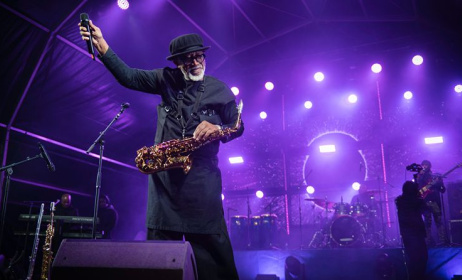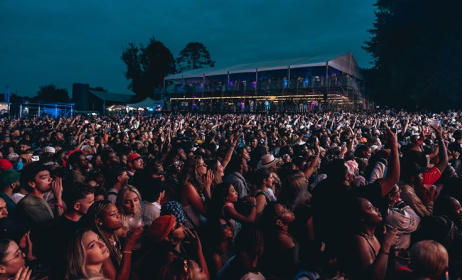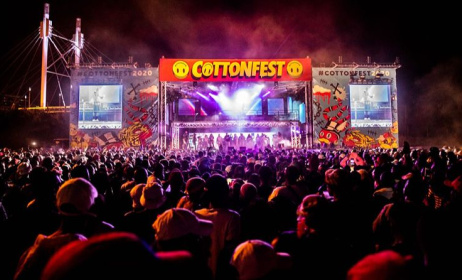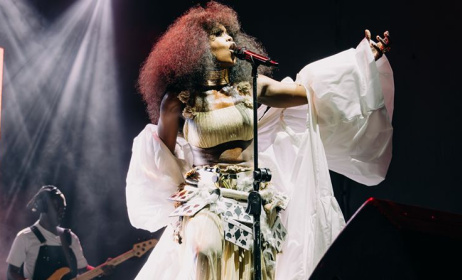Sauti za Busara wins hearts with diverse line-up
Zanzibar is sweltering hot but that doesn’t deter the locals and the tourists from gathering in Stone Town to experience the wonder that is Sauti za Busara festival.
 Malawian musician Faith Mussa at Sauti za Busara 2019. Photo: Rashde Fidigo
Malawian musician Faith Mussa at Sauti za Busara 2019. Photo: Rashde Fidigo Ugandan singer Jackie Akello. Photo: Rashde Fidigo
Ugandan singer Jackie Akello. Photo: Rashde Fidigo Tanzania's Wamwiduka Band. Photo: Rashde Fidigo
Tanzania's Wamwiduka Band. Photo: Rashde Fidigo South African band BCUC. Photo: Rashde Fidigo
South African band BCUC. Photo: Rashde Fidigo Morocco's Hoba Hoba Spirit. Photo: Masoud Khamis
Morocco's Hoba Hoba Spirit. Photo: Masoud Khamis
As you arrive in the ancient city, overjoyed faces greet you and you're immediately sucked into the ecstatic atmosphere. The evening showcases, featuring most of the music at the festival, took place at the main stage and the amphitheatre at the Old Fort. The daytime showcases were held at Forodhani Gardens, mainly featuring artists playing at the festival for the first time.
The beauty of the festival is that fans can choose the adventure depending on their musical tastes, making it possible for two people to come away having experienced a completely different line-up. While offering big-name performances, the festival also books rising stars. This year this category included Wamwiduka Band (Tanzania) and Lydol (Cameroon), who entranced the audience with exploratory sets.
“Sauti za Busara is not about the artists who have made it," festival director Yusuf Mahmoud says. "It is about musicians who are making good music and need a platform.”
In terms of making lasting impressions, the festival belonged to Wamwiduka Band. Living up to its name, which translates to 'something of great value’, the group knows how to delight a crowd with iterations of pure traditional influences. Hoba Hoba Spirit (Morocco) was another favourite at this year's Sauti za Busara. The band brought fast and rhythmic beats, riling up the crowd to near anarchy at the front of the main stage. BCUC (South Africa), who Music In Africa interviewed ahead of their maiden performance in Zanzibar, came with whistles, shakers, kick drums and congas, and a substantial dose of township hymns, with frontman Jovi Nkosi hypnotising the fans, who emerged from all corners of the festival grounds to dance wildly to circular battle rhythms. Nkosi spoke against racism and thanked Tanzanians for the support given to South African freedom fighters. “We will always be grateful for the support you gave our brothers during apartheid,” he said.
Another highlight was an exquisite set by the Swahili Encounters collaborative project, which brought together 11 musicians from Zanzibar, Tanzania, Kenya, South Africa, Sudan, Egypt and Algeria. Their performance was an explosion of propulsive beats, with the project's musical director Mandla Mlangeni's trumpet providing a steady voice during a set comprising Africa's prototypical music traditions.
Making his debut appearance in Zanzibar and East Africa, Faith Mussa (Malawi), also known as the 'electronic one-man band', sported an African print shirt and tight black jeans to go with his electro-folk set, mixing traditional songs with intense guitar playing and a loop pedal. His performance eased in slowly to give the festivalgoers enough time to familiarise themselves with his sound. Twenty minutes into the 60-minute set and everyone was up on their feet. Mussa is a human rights activist and spoke about oppressed groups such as people living with albinism. “I use my music to try and make a difference in society," the gospel musician said. "Most of the issues I talk about have happened to people close to me.”
Of all the days, Sunday featured arguably the best line-up. Asia Madani, a Sudanese musician based in Egypt, was the only female singer to play the main stage on that day. Her theatrical recital, backed by flawless singing and percussive prowess, proved that Sudanese musical can be ranked among Africa's best.
The good vibes continued with the colourfully dressed SOFAZ from Reunion Island. At first, when the band took to the stage, it was clear that the crowd wasn’t too familiar with their style of music. But they quickly warmed up to them with the introduction of a few dynamic compositions that fused traditional maloya with reggae, trance and electro.
Finally, it was time for Zimbabwean band Mokoomba to bring the Tonga language to the Busara stage. The group’s lead singer, Mathias Muzaza, quickly became the crowd’s favourite as the cheering and whistling got louder and louder every time his spine-tingling voice started a new song. The group brought tears to the crowd when they teamed up with Kenya’s Fadhilee Itulya and percussionist Kasiva Mutua to play ‘Todii’ in memory of the late Zimbabwean musician Oliver Mtukudzi, who passed away in January. Mokoomba's last song, which carried a soukous influence, brought out the festival's crew onstage for a final caper to end a fantastically curated festival.
Beyond the music, Sauti za Busara 2019 carried the overarching aim of igniting collective responsibility for social change through the Say No To Corruption theme. It also created a platform where musicians, booking agents, artist managers and label execs struck deals that could see some of the artists mentioned here reaching new heights.





























Comments
Log in or register to post comments